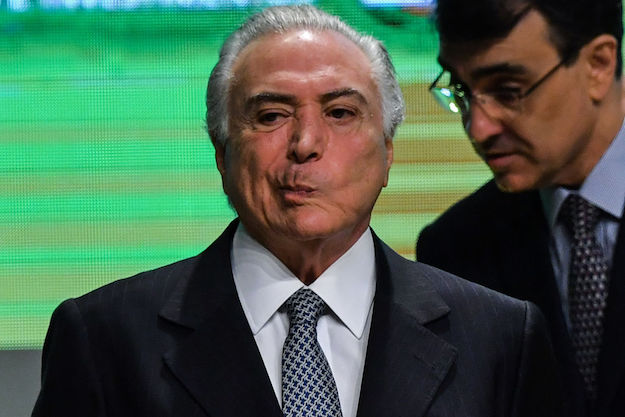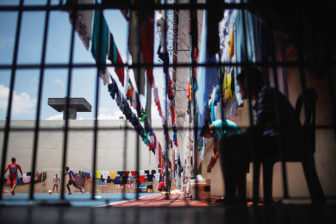Esse artigo foi publicado em português na revista Época
The email came from a friend, a well-known American journalist:
“What’s happening to Brazil? Is this the apocalypse? Can you elucidate and explain in two sentences?”
I stared dumbly at my computer. Two pages: Tudo bem. But two sentences? I was reminded of the old quote, sometimes attributed to the 17th century French philosopher Blaise Pascal: “If I’d had more time, I would have written a shorter letter.”
Perhaps predictably, my thoughts drifted first to corruption. If my friend – globally aware, but not a South America guy – had noticed Brazil, it was because of the unique awfulness of the current crisis: The worst recession in its modern history (and no real recovery since), a president with a 3 percent approval rating, half the political class in jail or under indictment, and so on. The Car Wash scandal had the requisite superlatives to explain such a mess: the biggest corruption case ever detected not just in Brazil but anywhere, according to the U.S. Department of Justice. Billions of dollars in fines, huge construction projects abandoned. The case had erupted in 2014, around the same time the economy began to fall apart. Surely I could start my answer here.
But – hold on. Would corruption really make a two-sentence summary of what ails Brazil? Because while corruption is unquestionably bad, most evidence (anecdotal and otherwise) suggests it’s actually pretty average by global standards. Transparency International’s annual ranking of perceived corruption levels puts Brazil 96th out of 180 countries, comparable to India, China and Kuwait. Don’t those countries continue to grow and thrive despite the billions of dollars being siphoned away?
Maybe the problem was broader, I thought. I remembered the phrase I’d heard ten thousand times during my years in São Paulo. “Ah, this country would be fine, if only we had better politicians.” And no doubt: Fernando Collor, Eduardo Cunha and Sergio Cabral (to draw three names out of a hat) were clearly not the finest people Brazil had to offer. But didn’t Car Wash also show us huge swathes of the private sector were just as rotten as the bums in Brasília? And – forgive me, Brazilian friends – isn’t criminality clearly a massive problem throughout society as a whole? In a country with 60,000 homicides a year? São Paulo alone sees at least 530 thefts per day. One study suggested the country loses seven times more money to tax evasion than it does to corruption. Blaming politicians, as if they were alien from the rest of society, has always felt exculpatory to me – you hear that refrain not just in Brazil, but in Argentina, Mexico and (yes) the United States. It always rings hollow.
But perhaps that’s the point – it’s not supposed to be average people in positions of leadership. I’ve met many truly amazing Brazilians over the years – honest, compassionate, educated, modern. But, with a few notable exceptions, they do not pursue the kinds of positions that can make the most positive impact – in government or the private sector. I would cite a variety of reasons for this: the pervasive sense that both politics and big business are a “dirty game,” rules for elections and campaign finance that protect incumbents (clearly seen in this 2018 election cycle) and perhaps a broader lack of civic cohesion and responsibility that comes with living in a country with such a huge gap between rich and poor.
Look at the way that former Supreme Court Chief Justice Joaquim Barbosa and TV show host Luciano Huck both turned down good chances of becoming president this year, essentially deciding the effort wasn’t worth it. I personally know a half-dozen Brazilians about my age (I am 40) who passed up decent opportunities to run for Congress, mumbling something about 2022 being a better time. By contrast, some other countries I know well in Latin America – Colombia comes to mind, as do Chile and the current generation in Argentina – have succeeded in attracting many of their best and brightest into positions of real power. Their glaring absence in Brazil – this mismatch, between society’s finest people and its most important leadership roles – truly is unusual. Not just in politics, but elsewhere.
OK, this seemed satisfying – for at least one of my sentences.
For the second one, I went to the history books. Any deep discussion of Brazil’s problems has to start with inequality – the colossal injustices that began with colonization, were worsened by slavery, and continue into the modern day. Most rankings put Brazil somewhere among the world’s Top 15 or 20 most unequal countries, and this is definitely not a list you want to be on – it includes South Africa, Haiti, the Central African Republic and others. Inequality has been shown to fuel criminality and retard economic growth, among many other ills. It also destabilizes democracies, as the majority is perpetually unsatisfied with its relative position in society and tends to lash out at the ballot box.
But again, let’s be real – the world is full of countries that have overcome historical burdens, whether of war, poverty, ethnic hatred or otherwise. Unsuccessful countries remain fixated on their past; the good ones set about solving their problems. We basically know what perpetuates inequality in modern-day Brazil: not just education, but a web of privileges and protections that ensure the rich stay rich, and make life hell for anyone who tries to compete with them. Brazil remains one of the world’s most difficult places to create a new business – ranked 176th out of 190 countries in this category by the World Bank. It remains the most closed major economy in the Americas, thanks to tariffs and subsidies that shield tycoons from foreign competition – and force Brazilians to either buy their products or fly to Florida to purchase better ones. It is a country that charges some of Latin America’s highest taxes so that some politicians, generals and judges can enjoy perks unheard of even in Europe, and civil servants can retire in comfort at the ripe old age of 55.
Indeed, there are a thousand such tricks that make entrepreneurship difficult, keep people out of the formal economy and ensure the poor stay poor. None of them are that difficult to reform from a technical perspective. What’s missing is the political will to do so.
Normally, a presidential election would provide an opportunity to move on from a crisis, and embark on a new, more hopeful path. But sitting here today, hardly any of the candidates running this October seem likely to meaningfully address the country’s real problems – either because they lack the right ideas, or because they seem incapable of building the support in Congress and within society to do so. And that, I believe, is what makes the current moment in Brazil feel so asphyxiating – and so unique from a global perspective.
So, here was my reply to my friend:
“Too many bullshit privileges for the elite. Not enough good leaders.”









